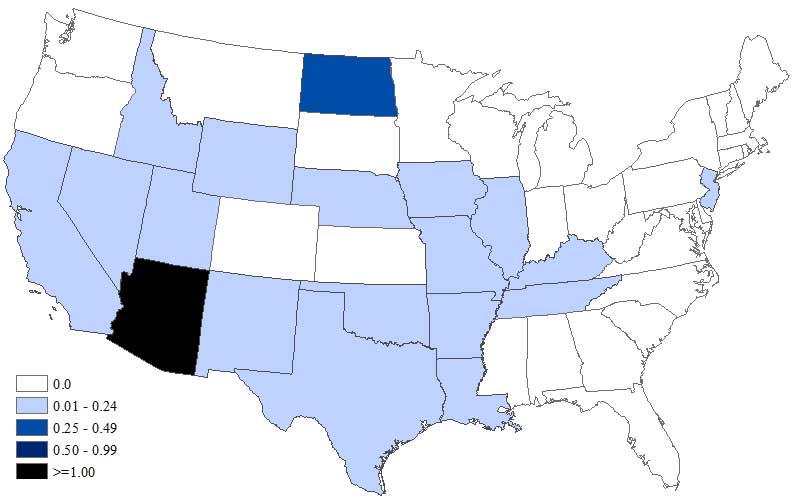Milton and Betty Harbuck endured four months of recovery after contracting the West Nile virus.
by Warren WatkinseditorWith a name indicating it came from the other side of the world, West Nile virus seems to be a disease residents of Sherwood should not worry about. But the story of Dr. Milton Harbuck will change your mind.Harbuck, a 25-year Sherwood resident, was stricken by the virus last year, and he and his wife, Betty, are counting their blessings today after a four-month fight. A dentist who practiced in Malvern, he served on staff with the Veteran’s Administration and retired in 1989.Tuesday, Aug. 31, 2004, Harbuck awoke with a headache and fever. During the next week, his doctor prescribed antibiotics and antihistamines, thinking it was something much more common.Then a week later, Harbuck was rushed to the hospital with a 103-degree fever after a friend found him pacing the hallway of his home in a daze. The next day a doctor ordered a blood test for, among other things, West Nile virus. After three nights, he was transferred to the intensive care unit with a temperature of 104.5 and placed on a ventilator.The next Wednesday the test results came back.“My daughter said, ‘Mom, they got the results back, and it’s West Nile virus,’” said Betty. “I had just killed a mosquito when she said that.”Remembering the specific bite that infected him is impossible, but Betty seems to remember one particular mosquito. “I said to him one day, ‘You have a mosquito bite on your cheek.’ He said, ‘Do I?’ We think that might have been it. Who knows?”According to Baptist Health, where Harbuck was treated, the test results did show he was suffering from West Nile Virus, a mosquito-borne virus that can cause a range of symptoms of varying severity in humans. There are no medications or vaccines that can counteract the virus, only the symptoms can be treated.Seventeen days later Harbuck was released from ICU and transferred to Semper Care, a long-term acute care facility located on the Baptist Health Medical Center—Little Rock campus, where he was received a tracheotomy.“I didn’t think they would ever get him out of ICU,” Betty said. “They didn’t think he would make it.”“I don’t remember any of it until 10 and a half weeks after going into the hospital,” Harbuck said. During that time Harbuck had no food or water by mouth; he was not in a coma, but not able to communicate.Then on Oct. 15 the miracle happened.“I got a call from the hospital,” Betty said. “A funny-sounding voice spoke to me, and I was thrilled. It was him.”Harbuck was transferred to the Baptist Rehabilitation Institute Oct. 28, where he spent three weeks before being taken to Briarwood Recuperative Care for 31 more days. Finally, after 18 more days in BRI, the ordeal was over.“The doctors said, ‘You’re our miracle man,’” Betty said.Harbuck went into the hospital on Sept. 7, 2004, and came home Jan. 7, 2005, a day before his 76th birthday—four months to the day.Down 35 pounds, Harbuck now receives daily therapy treatments in his home. The virus left him with a paralyzed right arm, severe weakness, slurred speech and memory loss.“I feel good but there is that trepidation of how the transition will go,” Harbuck said. “I was in the hospital so long and everything was done for me.”The incubation period for West Nile virus is five to 15 days. The Harbucks live on the bank of Five Mile Creek in south Sherwood, just on the border with North Little Rock.Is there a chance more Sherwood residents could become infected? Health Department officials warn against the possibility throughout the state constantly, not just in Sherwood.The city of Sherwood has an aggressive campaign to fight mosquitoes, using a garlic-based spray instead of the diesel fuel used years ago.Spraying one’s body with repellant is recommended. “Deet is the best defense against it, but you have to be careful with children, because they may have complications with Deet,” Harbuck said. “I was a healthy man with a miniscule chance of getting it—and I got it,” Harbuck said.
News Clips and Information on West Nile Virus Survivors. Videos and links to News Articles on West Nile Virus Families, West Nile Deaths, West Nile Virus Prevention and West Nile Virus Symptoms
Tuesday, March 29, 2005
Subscribe to:
Post Comments (Atom)
CDC West Nile Virus Info
Skip directly to page options Skip directly to A-Z link West Nile Virus Neuroinvasive Disease Incidence by State 2019 West Nil...

-
Teenage girl in Menifee dies after four-year battle with West Nile illness Download story podcast 10:00 PM PST on Wednesday, December 10...
-
Skip directly to page options Skip directly to A-Z link West Nile Virus Neuroinvasive Disease Incidence by State 2019 West Nil...
-
Tosa man battling West Nile dies Steiner was principal of Wauwatosa West High School By KAWANZA NEWSON knewson@journalsentinel.com Posted: N...

No comments:
Post a Comment